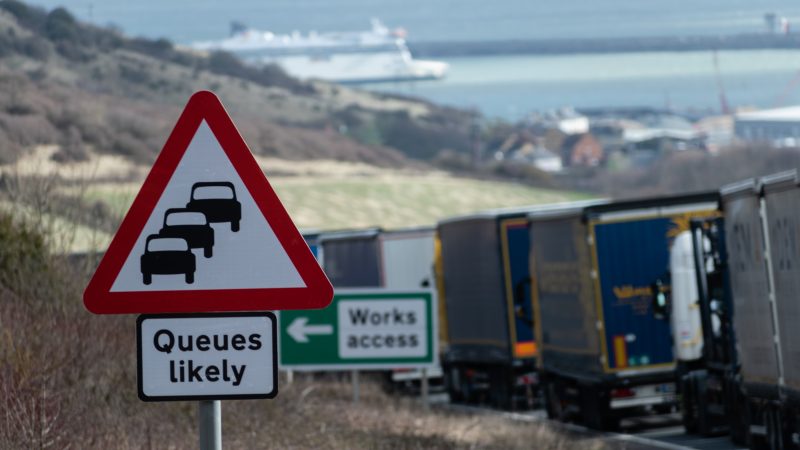
Unlike Christmas, the repercussions of the government’s shambolic Brexit preparations have come early – and they are causing misery to HGV drivers. Lorry queues stretching for 20 miles along the approach to Dover have been occurring in the run-up to the holidays, with massive tailbacks also reported in Holyhead.
Roll-on roll-off links from Kent and Wales are not the only issues facing Britain’s coastal gateways. At major container ports, such as Felixstowe, Southampton and London Gateway, a perfect storm has created serious backlogs. To ensure Covid-19 safety, port operations have necessarily slowed, even as the workload has increased, due to Brexit stockpiling, Christmas demand and docks clogged by large deliveries of personal protective equipment.
The government’s response to this has been to temporarily relax maximum driving times for HGV drivers, with the very real possibility that it will be extended into 2021, even though there are more than enough hauliers to pick up and drop off loads.
The suspension will not resolve the congestion problem – putting more drivers into the port areas will simply increase congestion and make the problem worse – and there are major safety implications. Driver fatigue is much a higher risk during the winter months, when a lack of daylight and poor weather makes driving an HGV more stressful and dangerous.
The problem lies within the ports, where labour shortages – linked to attacks on worker pay and T&Cs – that have long been an issue, are exacerbating the current delays. In fact, there are more than enough lorry drivers, with many, particularly those working for industries such as brewing and hospitality, either furloughed or jobless due to coronavirus restrictions.
To end coastal congestion and prevent the situation worsening after the transition period ends on December 31st, the government must end the uncertainty over a Brexit deal and allow key players to understand future trading operations.
Skimping on manpower and treating workers poorly will only worsen the problems being experienced at the UK’s ports. Both ministers and port operators must ensure that there are sufficient dock workers to meet current demands and future challenges. This would go some way to helping Britain’s lorry drivers, but more needs to be done if those who keep our food, medical, industrial and retail supply chains moving are to meet the logistical changes and challenges of 2021.
The government has already announced that there will be at least four massive lorry parks in Kent to deal with delays caused by increased checks and paperwork from leaving the EU. Despite the government admitting that substantial delays in the new year may well occur, however, Unite has only recently been told what facilities will be available at the lorry parks and has received no information about how extensive they will be.
It is not just drivers and residents in Kent, with many fearing the Garden of England will be turned into the Toilet of England, who are being kept in the dark. This applies to communities and hauliers at other key ports facing congestion and lorry parks, too.
As delays will occur while the UK is gripped by the Covid-19 pandemic, decent and clean toilets and washing facilities with hot and cold running water are crucial. Provision of hot food and areas for drivers to relax outside their lorries to combat the dangers of fatigue are also necessary.
To put it bluntly, a few smelly portaloos and the odd burger van are not sufficient to deal with the scale of delays at Britain’s ports that will occur whether or not a deal is reached – especially when those delays come in the middle of winter.
Unite is the not the only organisation that has called on the government to pull its finger out over the gridlock at Britain’s ports. The British Retail Consortium (BRC) and the Food and Drink Federation (FDF), concerned about disruption to their members, have called for an investigation by parliament.
It is clear that government needs to come up with a solution, and quickly, to a problem nearly entirely of its own making. But that solution must be one that doesn’t result in workers in the food, drink and retail industries – particularly those driving potentially dangerous vehicles – being forced to work excessive hours as result of a surge in goods being delivered as congestion is eased.
Whichever industry they deliver to, HGV drivers in the UK are facing a crisis and must not be made to pay the price for the government’s mistakes. Their concerns must be acted upon by ministers urgently. The fact that Unite is having to make this call at such a late stage is shocking, but not unsurprising.
It has only been in the last few days, the equivalent of one minute to midnight for Brexit, that the government finally engaged with the union, following months of repeated pleas that it would be sensible to avert the congestion now engulfing ports rather than try to manage it. Unfortunately, the government’s complete lack of preparation and the resultant chaos were as predictable as night following day – and the blame lies firmly at the feet of ministers.




More from LabourList
‘As metro mayors gain power, Labour must tighten political accountability’
Letters to the Editor – week ending 22 February 2026
‘The coastal towns where young people have been left behind by Whitehall’